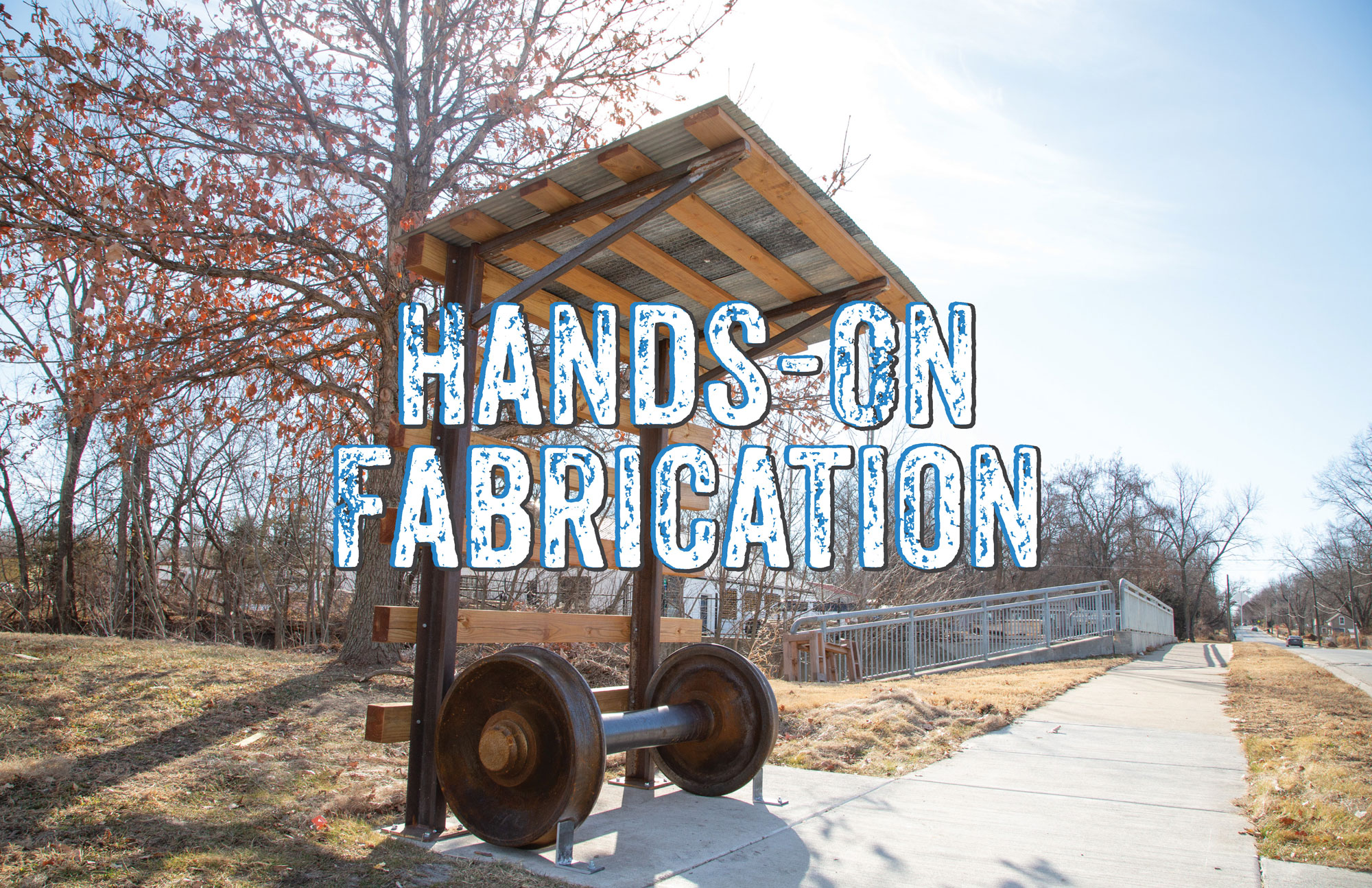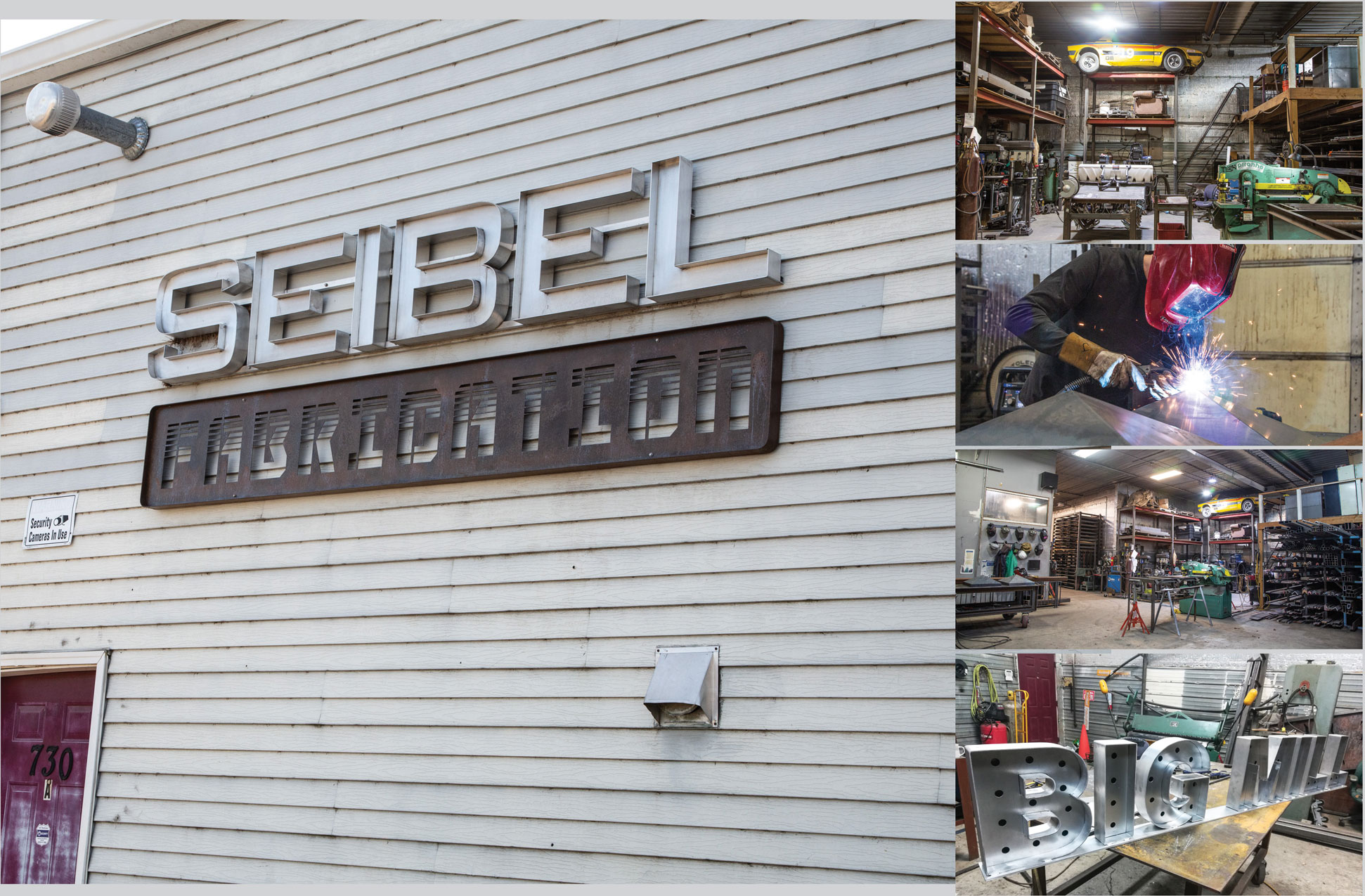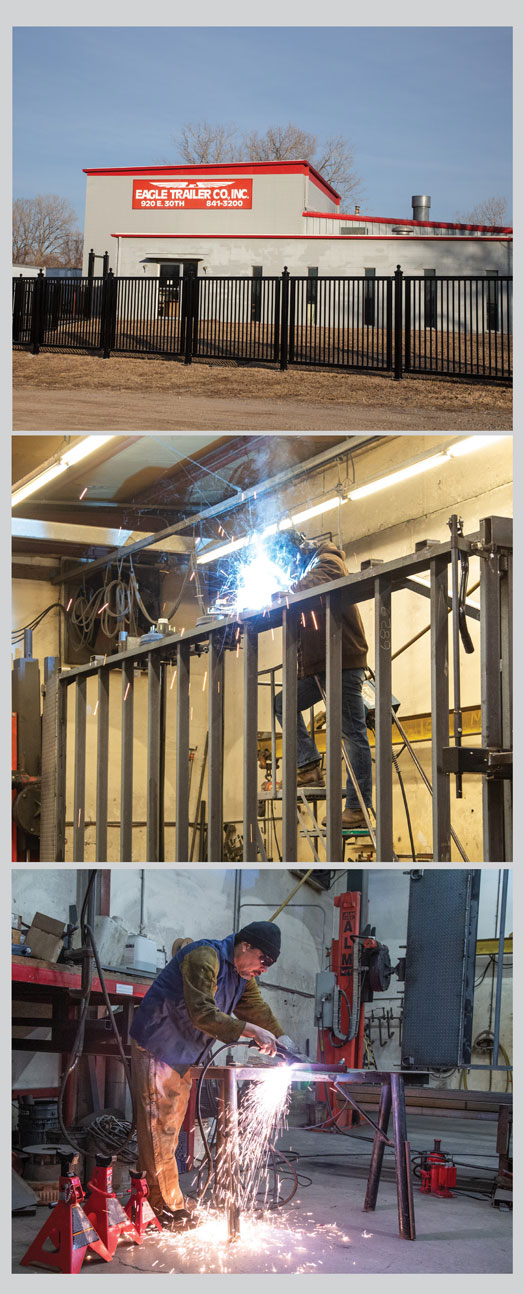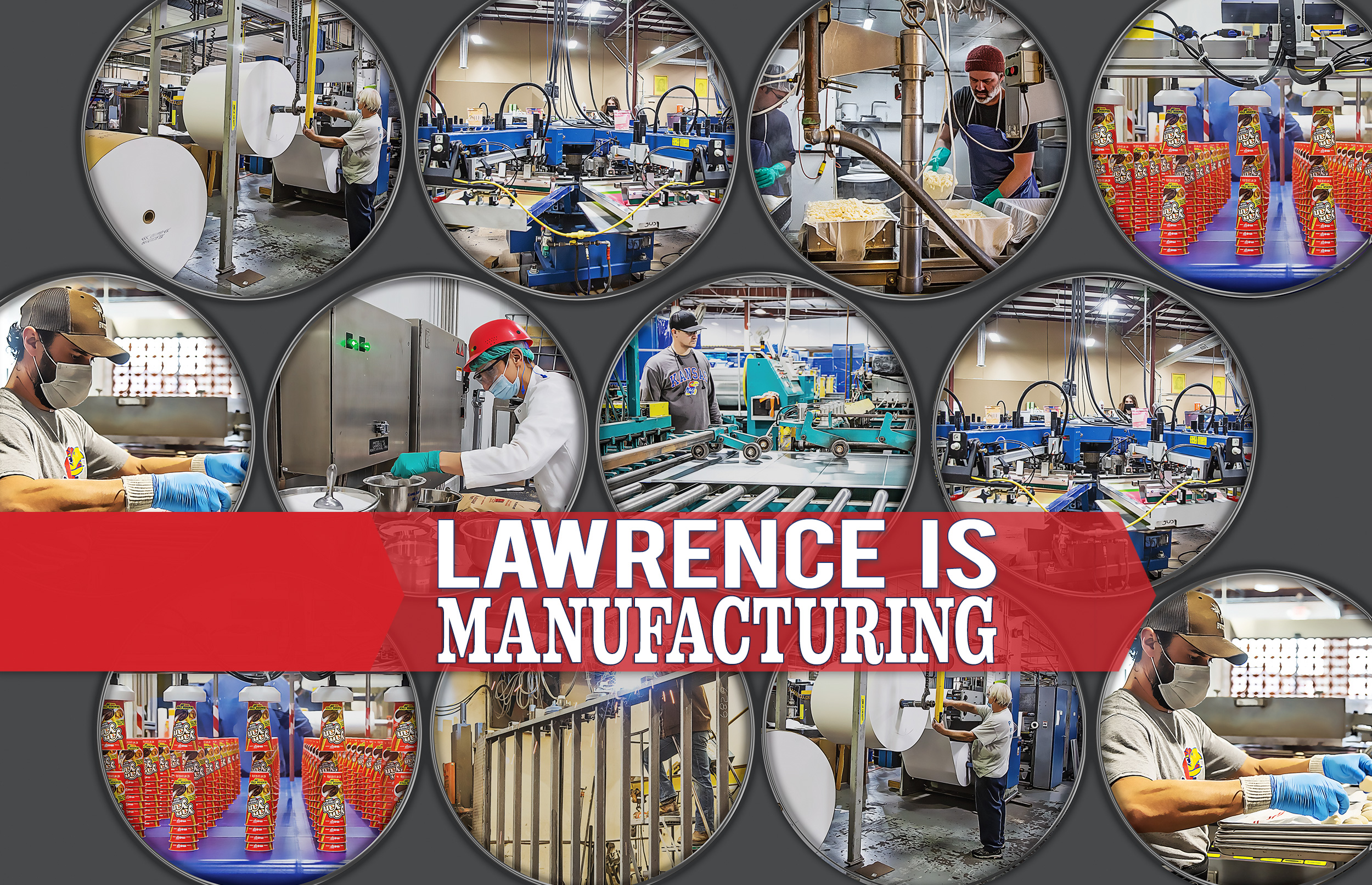| story by | |
| photos by | Steven Hertzog |
| OPEN A PDF OF THE ARTICLE |
Metal is an essential part of daily life and integrating new technology into the manufacturing process is giving the industry a boost.

An artistic bus shelter at Haskell & 11th by Seibel Fabrication
Manufacturing is the backbone of America’s economy. That’s not industry speaking, it’s a hard fact.
There’s no place this is more prevalent in manufacturing than in those that require the skilled, blue-collar trades: welding, metal fabrication and metal manufacturing. Many of the metal products you see assembled in shops, and homes, and on the backs of cars in Lawrence were not developed in Iowa or Michigan or overseas, but right here in Lawrence. Because of our vibrant business scene, not just in consumer goods but in industrial pieces, often businesses and consumers don’t have to leave the city limits to find what they’re looking for.
Bending Metal
Jonah Seibel, owner of Seibel Fabrication, owns one of those manufacturing shops. Located in North Lawrence in a small warehouse, the shop is a jack of all trades.
“We fabricate custom pieces for clients, so mostly architectural stuff like railings and staircases,” Seibel explains. “Structural stuff, but we’re also sort of the village blacksmith, and we fix things that are broken.”
He says he got his start in this business not because of a personal interest but because of his friends in high school.
“My friends were doing welding in high school, [and]I wanted to do stuff that they were doing,” Seibel says. “So I took a welding class in high school … and it was one of the few, that class and drafting class, which I still use that obviously, in this business, were the two classes in high school that I really enjoyed. So after high school, I got a job at a local welding company and … learned how to do things quicker, where you could actually make a living doing it.”

Seibel Fabrication is an eclectic workspace for Jonah to be creative.
He says he could have made more money at McDonald’s, but he still enjoyed doing the job. After that job, he went through another shop and a stint in carpentry before opening up Seibel Fabrication. Seibel came back to the industry, he says, because he enjoys playing with metal.
“I mean, there’s a lot of people doing wood, so it’s something that’s less common, and you get a lot more design freedom with metal,” he explains. “You can do things that you can’t do with other materials, which I really enjoy. So it allows you a lot of design freedom. I guess I’m just kind of a maker by nature.”
Another manufacturing company in Lawrence that is slightly more specialized but nonetheless important is Eagle Trailer Co. Started in 1983, president Kevin Frederickson says operating for this long is hard for a company.
“Most companies just last 2½ to three years,” Frederickson says. “Sixteen [to]17% don’t make it to eight years. Two percent make it just 20 years.”
Eagle Trailer Co. makes and repairs trailers for shops and people across the Midwest. Frederickson says his company repairs trailers quickly and gets a lot of business because of that.
“We repair trailers for individuals and companies from Kansas City because our prices are low, and we do it so quickly,” he says. “We turn it around usually within 24 hours.”
Technology in the Sector
Despite still being a job that is mostly done by hand, new technology is starting to play a big part in the manufacturing sector. Integrating technology into the daily process of the production of metal objects or even putting the technology inside the objects is moving the industry forward.
With Seibel’s job, he gets to play with a lot of expensive equipment. Other than welding equipment, forklifts in the middle of a small warehouse and several nice pieces of machinery, the biggest and perhaps most expensive piece of machinery in the building is a plasma cutter. He says because of costs, that’s likely the biggest piece of machinery he’s getting for a while.
“There is some really amazing technology in the industry right now, but it’s so expensive that it’s kind of exclusive to … bigger companies,” Seibel explains. “You could go spend $10 million … no problem on machinery. It’s a scale that most smaller companies are not going to get to, … at least not anytime soon.”
However, the plasma cutter is helping him create more elaborate designs and more accurate pieces, such as a piece for The Raven Book Store downtown. Although Seibel acknowledges it is an extremely useful piece of equipment, it is quite hard to use.
“Well, if everything goes right, yes. It’s kind of like a fickle printer,” he says. “It’ll have different problems all the time. It took a long time to figure it out because there’s different parameters it has to know. Everything’s going to change depending on what you’re cutting. If you’re cutting … half-inch-thick steel, the settings on the machine are quite a bit different than if you’re cutting something superthin like 18-gauge ….”
Integrating technology into the equipment can be hard to do. A company has to make sure everything lines up perfectly, and every last bit of it works before shipping it to the customer. Eagle Trailer Co. has been working to do that to make driving their trailers safer. Frederickson says an automatic break system the company has started to integrate helps the driver regain control of the trailer.
“The analog brake system is just a unit that’s bought separate as an optional part,” Frederickson says. “It’s put on a trailer, and it’s hooked up to the brakes. And if the trailer starts to sway, the sway is detected, and then brakes are applied individually and done in such a way that reduces the sway of the trailer so that the operator can slow down and regain and maintain control.”

Welding inside the Eagle Trailer Co warehouse.
Working with Customers
Meeting customers’ needs is hard work, as is making sure things are available and ready to go when a customer needs it—it’s one of the most important aspects of a business. It’s even more important when most of your customers are other businesses.
Siegel Fabrication doesn’t just make things out of metal; the company also does wholesale of metal parts, such as beams. Siegel says most people who buy from him are not random individuals off the street but contractors who need somewhere to buy metal at wholesale prices.
“We do metal sales as an important part because there’s not really a good supplier of metal in town. So we just buy stuff, and people come in and just buy it from me,” Siegel says. “[Retail stores] have a very small amount, and it’s very overpriced. It’s much cheaper to come here and get it, and we can also cut it to length for you.”
Eagle Trailer Co. prides itself on quick turnarounds for its customers. Frederickson says his employees work fast, making sure orders get out to customers quickly.
“Just a few years ago, we got a trailer order in,” he says. “And it was a big 20-foot trailer, and it weighed probably 3000 pounds, and it would carry 10,000 pounds. We got that order Monday morning, and the customer came and picked it up on Wednesday. That’s an incredibly quick turnaround. And that’s one of the most important things to customers is availability.”
However, Frederickson adds, the last couple years have been hard to keep up with because of pandemic staffing issues. Training takes time because of the industry. There’s a reason there are whole technical college degrees for welding.
“The last two years has just been terrible, because we just can’t do [quick turnarounds],” Frederickson explains. “Because … the worst workforce and shortages and things like that. But I hope to get back to that someday.”
Looking to the Future
The manufacturing sector grew 2.5% in January 2022, the smallest growth in manufacturing since the beginning of the economic recovery in March 2021, according to the Federal Reserve. That’s all manufacturing, not just big manufacturers. Kansas is one of the few states that had a compound annual growth rate (the mean annual growth rate of an investment over a specified period of time longer than one year) above 2% between 2009 and 2019. This is not because of big manufacturers primarily but because of small manufacturers doing small-time jobs for local businesses. This sector is going to continue to grow because of the strength of small businesses serving their local communities.




